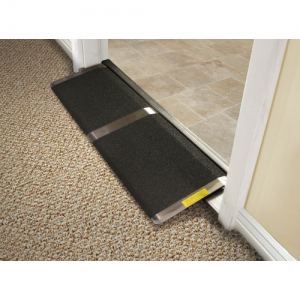Written By: Paul Denikin, Creator of Dad Knows DIY
 Children with disabilities require a level of care that can challenge a parent’s patience and endurance. Even the most basic needs, functions such as eating, toileting, bathing and sleeping, may present brand new problems on any given day. Parents can receive training but until one has dealt with the day-to-day rigors of caring for a child with a disability, it’s nearly impossible to be fully prepared. There’s a substantial degree of unpredictability to the situation, and that’s what parents really need to be ready for – the unexpected. It’s important to remember that children with disabilities are children, and should be treated with the same love and care that one would show any child.
Children with disabilities require a level of care that can challenge a parent’s patience and endurance. Even the most basic needs, functions such as eating, toileting, bathing and sleeping, may present brand new problems on any given day. Parents can receive training but until one has dealt with the day-to-day rigors of caring for a child with a disability, it’s nearly impossible to be fully prepared. There’s a substantial degree of unpredictability to the situation, and that’s what parents really need to be ready for – the unexpected. It’s important to remember that children with disabilities are children, and should be treated with the same love and care that one would show any child.
Basic Needs
Children with disabilities may require an array of accommodations based on the nature of their disability and require assistance that’s assertive and straightforward, yet specific to their needs. Even feeding can present serious risks if not done carefully. A child’s disability could cause difficulty with chewing and swallowing, and they may have trouble digesting certain foods.

An Adapted Scooper Plate
Parents may need to help their child get into position for eating and drinking, particularly if there are any disabilities with motion or flexibility. Behavioral or discipline problems could also create difficulties. A child with a disability may need extra attention when it comes to learning appropriate behavior patterns at mealtime (this may be especially difficult if the child has intellectual disabilities). If it takes longer than expected for your child to learn to feed himself, you may need the help of a physical therapist, whose expertise can help with other activities involving the mouth and tongue. Consider using assistive feeding equipment, including plates, bowls, and cups.
Bedtime
Helping a child with a disability get to sleep can impact the entire family. It can be hard to explain why it’s necessary to go to sleep, or to encourage your child to lay still. Special equipment may be necessary if your child has trouble breathing in a lying-down position. Seizures and muscle spasms add another dimension of care that some parents may find difficult to maintain, particularly if their own sleep is being disrupted or limited each night. If possible, try to get your child to sleep on her back, which is the least disruptive sleep position. If turning the lights out is a problem, keep a nightlight on in your child’s room.
Toilet Training
If your child has an intellectual disability, patience is your best ally when it comes to toilet training. Go slow and take it a step at a time. Be sure to celebrate each success and express how proud you are. It’ll make it that much easier clearing the next hurdle. Above all, don’t force the issue if your child isn’t ready, is actively resistant, or is having difficulty getting to the bathroom in time. If your child has had an ostomy device, it may take extra time to reach a comfort level going to the bathroom in this way.
Mobility

A Threshold Ramp
Mobility disabilities may require you to find special assistive devices, such as a wheelchair, walker or other aids. If your child uses a wheelchair, a ramp or lift may be needed to ensure ready access to your house. A threshold ramp could
cost as little as $100, but larger ramps can cost from $1,000 to $15,000, depending on material and size.
Celebrate Accomplishments
Remember, it’s important to be patient. Children with disabilities progress at different rates depending on the nature of their disability. Take the time to celebrate each achievement and use every opportunity to build your child’s self-esteem.



